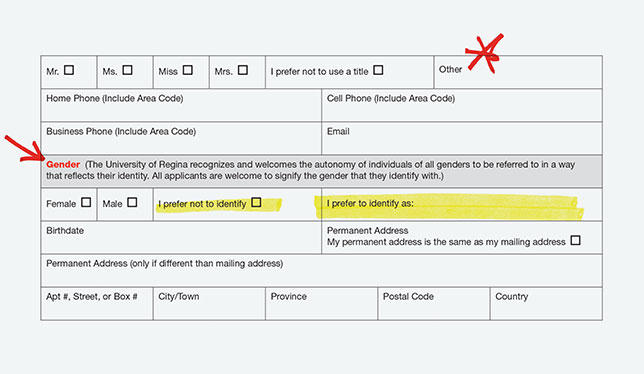
Applicants to the University of Regina and the University of Alberta have new options for indicating their gender. At U of R, the undergraduate application now lists “female,” “male,” “I prefer not to identify” and “I prefer to identify” followed by a blank space.
The update comes out of a new policy U of R introduced last fall that formalized the gender self-identification process, which involves meeting with the registrar to provide supporting documents like a medical note. U of R registrar James D’Arcy says this process guarantees the application is genuine and represents the student’s wishes. By the end of 2015, he had received four requests from students to change their stated gender to options including “gender fluid.”
U of A, meanwhile, has amended the paper application for undergraduate studies to include “another/prefer not to disclose” as a third gender option. U of A registrar Lisa Collins says the university collects information about gender as part of the province’s reporting requirements and to verify a student’s identity. “We’re looking at getting away from that because it’s not working for a number of our students,” she says.
The change applies to paper applications only because online admissions requests come through ApplyAlberta, the province’s postsecondary application system, which does not offer a non-binary gender option. Likewise, U of A’s own student portal, Bear Tracks, does not offer a non-binary option, though Ms. Collins says students may petition the registrar’s office directly to have a preferred gender on their file. As of late February, two applicants to U of A for the 2016-2017 academic year had selected the third gender option. Ms. Collins notes the option may ultimately apply to a small number of people, but that shouldn’t diminish the importance of having it available. “It really means everything to [these students] in terms of how welcome the feel on campus and in our classes,” she says.
Both universities have also formalized processes allowing students to indicate a preferred name on their records – a practice now permitted at many institutions, particularly in the case of transgender students, international students, and students leaving abusive relationships.
“I was approached two years ago by a transgendered student who told me their story and what it was like for them on campus,” Mr. D’Arcy says. “They were continuously outed on the class list during roll call and in those kinds of situations. Somebody who identifies as gender-fluid might choose to use the name Harvey instead of Nancy. Our view on that is: So what? If someone chooses to live their life as Harvey, who are we to stand in their way?”